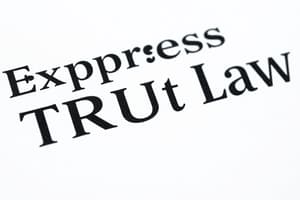Podcast
Questions and Answers
According to the Law of Property Act 1925, which of the following is true about resulting, implied, and constructive trusts?
According to the Law of Property Act 1925, which of the following is true about resulting, implied, and constructive trusts?
- They are not within the scope of this chapter
- They are not affected by any statutory provisions
- They are not affected by s 2 of the Law of Property (Miscellaneous Provisions) Act 1989 (correct)
- They are affected by s 53 of the Law of Property Act 1925
According to the Law of Property (Miscellaneous Provisions) Act 1989, which of the following is true about contracts for the sale or other disposition of an interest in land?
According to the Law of Property (Miscellaneous Provisions) Act 1989, which of the following is true about contracts for the sale or other disposition of an interest in land?
- They can be made without any formalities
- They can only be made orally
- They can only be made in writing (correct)
- They can be made orally or in writing
Which statutory provision is concerned with inter vivos transactions?
Which statutory provision is concerned with inter vivos transactions?
- Law of Property Act 1925
- Law of Property (Miscellaneous Provisions) Act 1989
- Law of Property (Miscellaneous Provisions) Act 1989, s 2 (correct)
- Law of Property Act 1925, s 53(2)
According to the text, which of the following is true about a direct assignment of an equitable interest?
According to the text, which of the following is true about a direct assignment of an equitable interest?
What was the basis of the decision in Oughtred v IRC?
What was the basis of the decision in Oughtred v IRC?
In Neville v Wilson, what did the Court of Appeal determine about a specifically enforceable agreement to assign an interest in property?
In Neville v Wilson, what did the Court of Appeal determine about a specifically enforceable agreement to assign an interest in property?
According to the text, what is the effect of a disclaimer on a gift?
According to the text, what is the effect of a disclaimer on a gift?
According to the text, in Hodgson v Marks, what was the plaintiff's agreement with Evans regarding the house transfer?
According to the text, in Hodgson v Marks, what was the plaintiff's agreement with Evans regarding the house transfer?
In Bannister v Bannister, what did the plaintiff claim regarding the alleged trust contained in the oral understanding?
In Bannister v Bannister, what did the plaintiff claim regarding the alleged trust contained in the oral understanding?
According to the text, why did Mr. Evans not rely on s 53 in Hodgson v Marks?
According to the text, why did Mr. Evans not rely on s 53 in Hodgson v Marks?
According to section 53(1)(b), what is the effect of not complying with the requirement of writing in a declaration of trust?
According to section 53(1)(b), what is the effect of not complying with the requirement of writing in a declaration of trust?
In the case of pure personalty, how can a trust be declared?
In the case of pure personalty, how can a trust be declared?
Under section 53(1)(c), when is writing required in a declaration of trust?
Under section 53(1)(c), when is writing required in a declaration of trust?
What is the requirement for a disposition of an equitable interest or trust under section 53(1)(c)?
What is the requirement for a disposition of an equitable interest or trust under section 53(1)(c)?
Which Act is discussed in Chapter 22, section 3?
Which Act is discussed in Chapter 22, section 3?
What is the definition of 'disposition' according to the Law of Property Act 1925?
What is the definition of 'disposition' according to the Law of Property Act 1925?
What is the purpose of the Statute of Frauds 1677?
What is the purpose of the Statute of Frauds 1677?
What is the leading example of the equitable doctrine of part performance?
What is the leading example of the equitable doctrine of part performance?
According to the text, which of the following is true about contracts to create a trust or dispose of equitable interests in pure personalty?
According to the text, which of the following is true about contracts to create a trust or dispose of equitable interests in pure personalty?
What is the effect of a declaration of trust where the settlor is the owner of the property both at law and in equity?
What is the effect of a declaration of trust where the settlor is the owner of the property both at law and in equity?
What is the requirement for a declaration of trust respecting land or any interest therein?
What is the requirement for a declaration of trust respecting land or any interest therein?
What is the effect of a declaration of trust where the owner of an equitable interest declares a bare or simple trust?
What is the effect of a declaration of trust where the owner of an equitable interest declares a bare or simple trust?
According to Vandervell v IRC, when the beneficial owner directs the trustee to transfer the legal estate to a third party and the transfer duly takes place, s 53(1)(c) does not apply. This means that
According to Vandervell v IRC, when the beneficial owner directs the trustee to transfer the legal estate to a third party and the transfer duly takes place, s 53(1)(c) does not apply. This means that
In Re Vandervell’s Trusts (No 2), the trustee company held an option to purchase shares in the company on such trusts as might be declared by the trustee company or Mr Vandervell. When the trustee company exercised the option, it informed the Revenue authorities that the shares would henceforth be held by it on the trusts of the children’s settlement. The dividends on the shares received by the trustee company were paid to the children’s settlement. The Court of Appeal held that
In Re Vandervell’s Trusts (No 2), the trustee company held an option to purchase shares in the company on such trusts as might be declared by the trustee company or Mr Vandervell. When the trustee company exercised the option, it informed the Revenue authorities that the shares would henceforth be held by it on the trusts of the children’s settlement. The dividends on the shares received by the trustee company were paid to the children’s settlement. The Court of Appeal held that
According to the text, a surrender of an equitable interest is considered a disposition because
According to the text, a surrender of an equitable interest is considered a disposition because
In Vandervell v IRC, Lord Upjohn pointed out that the object of s 53(1)(c) is to prevent hidden oral transactions in equitable interests in fraud of those truly entitled. However, he continued, when the beneficial owner 'owns the whole beneficial estate and is in a position to give directions to his bare trustee with regard to the legal as well as the equitable estate there can be no possible ground for invoking the section where the beneficial owner wants to deal with the legal estate as well as the equitable estate'. This means that
In Vandervell v IRC, Lord Upjohn pointed out that the object of s 53(1)(c) is to prevent hidden oral transactions in equitable interests in fraud of those truly entitled. However, he continued, when the beneficial owner 'owns the whole beneficial estate and is in a position to give directions to his bare trustee with regard to the legal as well as the equitable estate there can be no possible ground for invoking the section where the beneficial owner wants to deal with the legal estate as well as the equitable estate'. This means that
Study Notes
Requirements for the Creation of Trusts and Dealing with Equitable Interests
- Statute does not require any formalities for the creation of trusts or dealings with equitable interests.
- Resulting, implied, and constructive trusts are not covered in this chapter, but they are not affected by the statutory provisions.
- Inter vivos transactions, which are transactions between living persons, are mainly governed by statutory provisions.
- Contracts relating to the sale or disposition of an interest in land must be in writing and signed by both parties.
- There are no writing requirements for contracts to create a trust or dispose of equitable interests in personal property.
- Contracts to assign an equitable interest may be considered a "disposition" and subject to writing requirements.
- A declaration of trust can be made by the owner of the property or by a transfer to trustees with a direction to hold the property on specified trusts.
- For land, a declaration of trust must be in writing and signed by the person able to declare the trust or by their will.
- No writing is required for declarations of trust in personal property, and they can be made through unsigned writing, word of mouth, or conduct.
- Declarations of trust for equitable interests in real or personal property may require writing if it involves a direction to trustees by the equitable owner.
- Dispositions of equitable interests must be in writing and signed by the person making the disposition or their authorized agent.
- The requirement for the disposition to be in writing cannot be rectified later if not complied with.
Studying That Suits You
Use AI to generate personalized quizzes and flashcards to suit your learning preferences.
Description
Test your knowledge of the Law of Property Act 1925 and the Law of Property (Miscellaneous Provisions) Act 1989 with this quiz. Explore resulting, implied, and constructive trusts, contracts for the sale of land, inter vivos transactions, direct assignment of equitable interests, and the basis of the decision in Oughtred v IRC.





